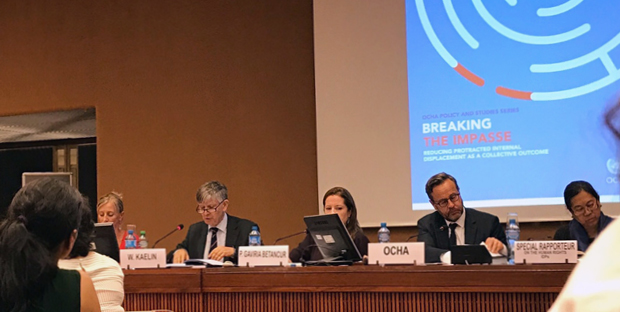A long-awaited report ‘Breaking the impasse: reducing protracted internal displacement as a collective outcome’ was launched at the ECOSOC Humanitarian Affairs Segment in Geneva.
A critical opportunity to better understand the reasons for and obstacles to overcoming protracted internal displacement, the report was commissioned by the United Nations Office for the Coordination of Humanitarian Affairs (OCHA), and written by Professor Walter Kälin and Hannah Entwisle Chapuisat. JIPS was happy to support the study, contributing with data analysis from profiling exercises in Somalia, Colombia, Iraq, and Cote d’Ivoire to inform several of the study’s key questions and recommendations.

In summarising the study’s findings, Dr. Kälin emphasised the importance of moving away from a narrowly temporal definition of protracted displacement, and instead taking a more comprehensive look at protracted displacement’s effects on internally displaced persons (IDPs), host communities, and local governments.
Dr. Kälin added that taking a more holistic approach to protracted displacement requires development and humanitarian actors to work together early on to be able to address the impact of displacement. In this light, the study recommends a move away from separate programme outcomes towards collectively defined and achieved outcomes.
Critical to achieving collective outcomes, is the availability of a context-specific and comprehensive evidence-base including needs, vulnerabilities and capacities of the displaced and a comparative analysis of different population groups.
During the launch, Prof. Kälin highlighted the value of profiling to provide this evidence, promoted the role of JIPS in providing strategic and technical advice on these processes in the field, and drew on the specific example of Mogadishu, Somalia where the identification of displacement-specific vulnerabilities through profiling helped to include displacement in the country’s national development plans.
JIPS welcomes the study’s recommendations to support Government-led profiling and joint analysis to inform context-specific responses to protracted displacement. We are pleased that the study emphasised collaborative profiling as a mechanism for humanitarian, development and government actors to advance many of the other recommendations outlined in the report.
Walter Kälin presented the report, and was joined by a panel including: Paula Gaviria Betancur, Presidential Adviser to Colombia; Cecilia Jimenez Damary, UN Special Rapporteur on the Human Rights of Internally Displaced Persons; Raphael Nägeli, Deputy Head of Human Security Division, Federal Department of Foreign Affairs, Switzerland; and Alexandra Bilak, Director, Internal Displacement Monitoring Centre. The panel discussed what the report means for the “Leaving no one behind” Sustainable Development Goals agenda.
The panel applauded the timeliness and depth of the report. Paula Gaviria Betancur from Colombia added that political will is key for assisting victims of displacement to overcome their vulnerabilities. Whilst Cecilia Jimenez reminded the audience of the importance of community participation, “IDPs are not mere beneficiaries, they should be part and parcel of their own solutions.” JIPS welcomed these interventions in particular, having experienced them first-hand in its work supporting the Government of Colombia and through the pilot projects linked to the ongoing Durable Solutions project.